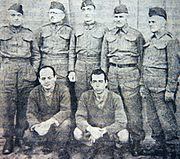Alexandros Papagos facts for kids
Quick facts for kids
Alexandros Papagos
|
|
|---|---|
| Αλέξανδρος Παπάγος | |
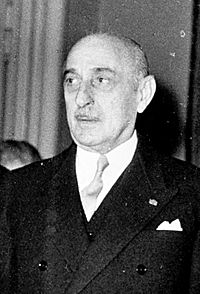
Papagos as Prime Minister.
|
|
| Prime Minister of Greece | |
| In office 19 November 1952 – 4 October 1955 |
|
| Monarch | Paul |
| Preceded by | Dimitrios Kiousopoulos (caretaker) |
| Succeeded by | Konstantinos Karamanlis |
| Personal details | |
| Born | 9 December 1883 Athens, Kingdom of Greece |
| Died | 4 October 1955 (aged 71) Athens, Kingdom of Greece |
| Political party | Greek Rally |
| Relations | Georgios Averoff (great-uncle) |
| Parents | Leonidas Papagos Maria Averoff |
| Alma mater | Royal Military Academy (Belgium) |
| Awards | |
| Signature | |
| Military service | |
| Allegiance | |
| Branch/service | |
| Years of service | 1906–1917 1920–1922 1926–1951 |
| Rank | |
| Commands | Commander-in-Chief of the Hellenic Armed Forces Chief of the Hellenic National Defence General Staff Chief of the Hellenic Army General Staff |
| Battles/wars | Balkan Wars Greek Civil War |
Alexandros Papagos (born December 9, 1883 – died October 4, 1955) was a famous Greek army officer. He led the Hellenic Army during World War II and the final parts of the Greek Civil War. He was the only Greek officer to become a Field Marshal, which is the highest military rank.
After his military career, Papagos entered politics. He started a political party called the Greek Rally. He became the Prime Minister of Greece in 1952. His time as Prime Minister was important for Greece. The country joined NATO, and the economy started to grow.
Contents
Alexandros Papagos: A Military Leader
Alexandros Papagos was born in Athens, Greece, in 1883. His father, Leonidas Papagos, was also a high-ranking army officer. His mother, Maria Averoff, came from a well-known family.
In 1902, he began his military training at the Brussels Military Academy in Belgium. He then studied at a cavalry school. In 1906, he officially joined the Greek Army as a Cavalry 2nd Lieutenant. He married Maria Kallinski.
Early Military Service
Papagos fought in the Balkan Wars (1912–1913). These wars helped Greece gain more land. He worked closely with the Crown Prince, who later became King Constantine. He was promoted to captain in 1913.
Later, he became a major in 1916. However, he was removed from the army in 1917. This happened because he supported the King during a big political disagreement called the National Schism.
He returned to the army in 1920 as a Lt. Colonel. He fought in the Asia Minor Campaign against Turkish forces. After a big defeat for the Greek army in 1922, he was dismissed again. But he was called back in 1926 as a colonel. He continued to rise through the ranks, becoming a major general in 1930 and a Lt. General in 1935.
Supporting the Monarchy and Metaxas
In 1935, Papagos helped bring back the Greek monarchy. He became the Minister for Military Affairs. He also supported Ioannis Metaxas when Metaxas took control of the government in 1936. This led to a period of strict rule.
As Chief of the Army General Staff, Papagos worked hard to prepare the Greek Army for a possible war. He wanted to make sure the army had good equipment and training.
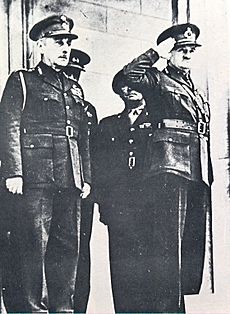
World War II Hero
When the Greco-Italian War started in October 1940, Papagos became the Commander-in-Chief of the Army. He led the Greek forces against Italy along the border. The Greek army successfully stopped the Italian attack. They even pushed the Italian forces back into Albania. These victories made Papagos very famous.
However, in April 1941, Germany invaded Greece. The Greek army fought bravely but was outnumbered. Papagos had to agree to the surrender of the Greek forces. The Greek government then moved to Crete.
During the Occupation
Papagos stayed in Greece during the German occupation. In 1943, he helped create a resistance group with other former army officers. This group worked against the German forces.
Because of his resistance activities, the Germans arrested him in July 1943. He was sent to concentration camps in Germany. In April 1945, he was moved to Tyrol. He was finally freed by the American army in May 1945.
Leading in the Greek Civil War
Papagos returned to Greece in 1945 and rejoined the army. He became a full General in 1947. In 1949, he was again made Commander-in-Chief during the Greek Civil War. This war was fought between the Greek government and Communist forces.
Papagos led the government forces to victory. He used a lot of aid from the United States, including special aircraft. He also used elite special forces units. His leadership helped end the war in October 1949.
For his great service, he was given the title of Field Marshal on October 28, 1949. He is the only Greek career officer to ever receive this rank. He continued to serve until 1951.
Alexandros Papagos: A Political Leader
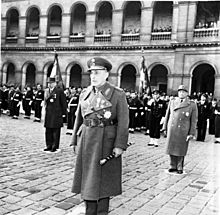
In May 1951, Papagos left the army to start a political career. He created a party called the Greek Rally. This party was inspired by a similar party in France. He won the elections in September 1951.
His party won even more votes in the November 1952 elections. They gained 239 out of 300 seats in Parliament. Papagos became the Prime Minister. People saw him as a strong leader.
His government worked to modernize Greece. They tried to rebuild the country after 10 years of war. Greece joined NATO during his time as Prime Minister. This was a very important step for the country's safety. The United States was also allowed to have military bases in Greece. This period also saw the beginning of the "Greek economic miracle," where the economy started to grow quickly.
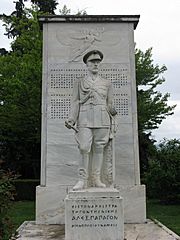
One big challenge for Papagos was the Cyprus problem. Most people in Cyprus wanted to unite with Greece. This led to protests in Athens. Papagos asked the United Nations to discuss the issue in 1954.
In 1955, a campaign started in Cyprus to remove the British and unite with Greece. Papagos was not in good health at this time. The events in Cyprus also caused problems between Greece and Turkey.
Papagos became ill in January 1955. He died on October 4, 1955, from a lung problem. The Athens suburb of Papagou, where the Ministry of Defence is located, is named after him.
See also
 In Spanish: Aléxandros Papagos para niños
In Spanish: Aléxandros Papagos para niños
 | Claudette Colvin |
 | Myrlie Evers-Williams |
 | Alberta Odell Jones |


